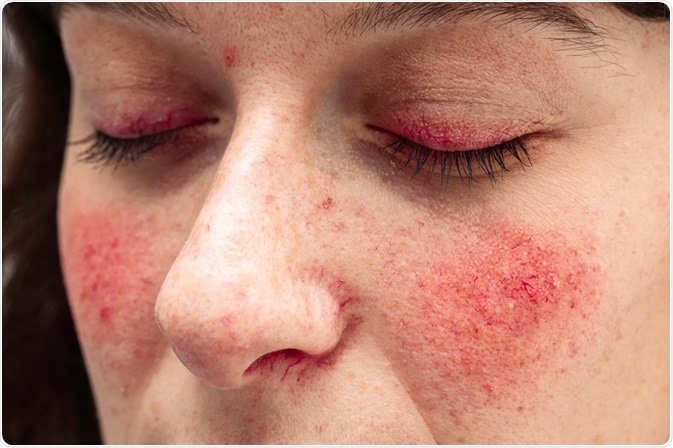Rosacea is a common skin condition characterized by redness and burning across the central areas of the face.

Image Credit: sruilik / Shutterstock.com
Symptoms of rosacea
Red rash
The initial symptom of rosacea is usually a tendency to flush, which causes the skin to turn red temporarily. Flushing mainly affects the face but may also extend along the neck and down to the chest. Flushing is often caused by particular triggers such as exposure to sunlight, hot or cold temperatures, strenuous exercise, and hot drinks.
This initial flushing symptom is often followed by the development of a persistent red rash across the middle areas of the face such as the cheeks, nose, and forehead. This persistent redness is referred to as erythema and resembles a patch of sunburn or the blotchy areas that can appear across the face while drinking alcohol.
Rosacea sufferers are often embarrassed by this rash because they assume people think it is caused by drinking too much alcohol. The rash mainly affects the cheeks and chin, but can also extend to the neck and chest areas. It may also cause a warm, burning, or stinging sensation.
Visible blood vessels
The blood vessels in the skin may eventually become permanently dilated and visible underneath the skin’s surface. This feature of rosacea is referred to as telangiectasia.
Papules and pustules
Raised red bumps called papules and pus-filled blisters called pustules may also start to develop in rosacea patients. Although these spots can look like acne, rosacea and acne are entirely distinct skin conditions.
Thickened skin
In severe cases of rosacea, the skin may start to thicken and swell, forming red, fleshy protrusions across the nose. This symptom is referred to as rhinophyma and tends to develop in men rather than women.
Ocular involvement
People with rosacea may also find that the condition starts to affect their eyes, which may become watery, itchy, bloodshot, dry, and sore. Collectively, these ocular symptoms of rosacea are referred to as ocular rosacea.
Trigger factors
Rosacea tends to come and go, with periods where symptoms are less severe being followed by a “flare-up” of the condition. Some examples of the factors that are often reported to trigger a flare-up include:
- Stress
- Sunlight
- Hot or cold temperatures
- Alcohol and spicy food
- Strenuous exercise
- Ingredients in cosmetics
Prevention
Although it is not possible to cure rosacea, it is possible to manage the condition to minimize the likelihood of a flare-up occurring. One of the main ways this is achieved is through the avoidance of factors that trigger or worsen symptoms of the condition.
Sunlight
Sunlight is the factor most commonly reported to trigger rosacea symptoms. Rosacea sufferers should always use sunscreen, even on cloudy and overcast days. A sunscreen with a sun protection factor (SPF) of at least 30 that also protects against ultraviolet A (UVA) and UVB rays is recommended.
Any exposed skin can also be covered with clothes or a hat to reduce skin irritation. During the summer, rosacea patients should try to minimize their exposure to the sun, particularly around midday when the sun is at its hottest.
Stress
Stress is another common trigger factor. To this end, rosacea sufferers are advised to develop relaxation techniques such as deep breathing or yoga that they can use to reduce their stress levels.
Exercise can also reduce stress, although a low-intensity exercise should be chosen such as swimming or walking, since vigorous exercise is also known to exacerbate symptoms in some individuals.
Food and drink
Other common triggers of rosacea symptoms include alcohol and spicy food. Rosacea sufferers may need to eliminate these items from their diet.
However, the dietary triggers of rosacea vary widely between individuals and patients are often advised to keep a diary logging their exposure to any potential food triggers. This can help patients to identify which specific food types they should avoid in the future. How severely the food seems to affect rosacea symptoms should also be recorded in the diary.
Cold weather
Rosacea sufferers can minimize their exposure to the cold by covering any areas of the face exposed to the cold with a scarf or balaclava.
Cosmetics and skin care
Rosacea patients should stick to the following skincare techniques to help keep their symptoms under control:
- Skin should be cleaned everyday using a non-abrasive, soap-free, and non-scented cleaning product that has a neutral pH.
- Lukewarm water should be used when washing the face. Once washed, the face should be allowed to completely dry before any cosmetics are applied.
- The skin should be moisturised if it is feeling sore.
- Water-based cosmetics and skin products that do not require a solvent for removal should be used.
- An electric razor should be used rather than a blade should be used to remove any hair.
- In cases where the eyes are affected by rosacea (blepharitis), the eyelids should be cleaned using lukewarm water and a small amount of cleanser. Ideally, eye make-up should be avoided; however, in cases where people do choose to wear it, products that can be washed off easily should be used.
References
Further Reading
Last Updated: Feb 20, 2023